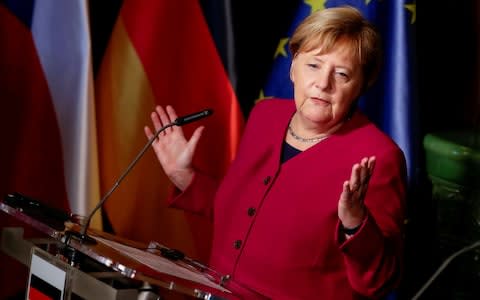Angela Merkel says she will step down as Chancellor in 2021 after bruising regional elections

Angela Merkel signalled the end of a political era on Monday when she announced she will give up the leadership of her political party next month and stand down as German chancellor when her current term expires in 2021.
The woman who has dominated European politics for 13 years stunned Germany with the announcement in the wake of historic losses for her Christian Democrat party (CDU) in regional elections at the weekend.
“I am convinced it’s time to begin a new chapter,” Mrs Merkel told a press conference in Berlin. “I once said I was not born chancellor. And I have never forgotten that.”
The veteran leader said she wants to complete her current term as chancellor but will seek no future political office, either in Germany or at the European Union, where she has been talked of as a future commission president.
She said she would step down as CDU leader at the party conference in December, paving the way for a successor to lead the party into Germany’s next elections.

Mrs Merkel said she had come to the decision to stand down over the summer, and that her party’s disastrous performance in regional elections at the weekend convinced her she was right.
“As party leader I bear responsibility for everything, both for success and failure,” she said. “The picture presented by the government is unacceptable. We cannot simply go back to business after the elections in Hesse and Bavaria. I am convinced that we must stop, or at least that I must. And that we must make yesterday’s elections a turning point.”

Mrs Merkel’s decision to step down as party leader is a clear attempt to quiet the growing rebellion inside her party so she can end her time in power on her own terms.
But it is by no means clear whether she will be able to see out her current term as chancellor or if her current fragile coalition will survive until 2021.
Mrs Merkel acknowledged that she was taking a risk by splitting the roles of chancellor and party leader. “But I am convinced this approach offers more opportunity than risk, for our country, the government and my party,” she said.
Although she insisted she would stay out of the contest to choose a new party leader, the move appeared to be an attempt by Mrs Merkel to manage her succession.
It is an open secret that her preferred successor is Annegret Kramp-Karrenbauer, the current party chairman popularly known as “mini-Merkel”, who declared her candidacy for the leadership on Monday.

But Mrs Merkel’s announcement triggered an immediate race to succeed her - and not all the candidates would be as easy for her to work alongside as Ms Kramp-Karrenbauer.
Jens Spahn, the health minister and an outspoken critic of the chancellor, announced his widely expected candidacy.
And there was a surprise declaration from Friedrich Merz, a retired party leader who was elbowed aside by Mrs Merkel in 2002 but now wants to make a comeback. Mr Merz was swiftly endorsed by the powerful CDU business wing, meaning he is a serious contender.

If Mr Spahn or Mr Merz were to become leader, Mrs Merkel might find it hard to secure the party’s backing to stay on as chancellor until 2021.
Armin Laschet, the powerful regional prime minister of North Rhine-Westphalia, Germany’s most populous state, and a Merkel ally, said he was considering entering the race but had not made up his mind.
Mrs Merkel’s hopes of seeing out her term as chancellor will also depend on her coalition partners.
There are growing calls within the Social Democrat party (SDP) to leave the government after it suffered even worse losses than the CDU in regional elections. But with opinion polls predicting the SPD could lose a third of its seats in parliament, the party’s MPs may be reluctant to force early elections.

 Yahoo News
Yahoo News 